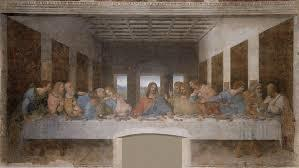Luke 21‒22
The First Christian Passover
Luke 22
14 And when the hour had come, He reclined, and the
twelve apostles with Him.
15 And He said to them, With longing I have longed to eat
this Passover with you before I suffer.
16 For I say to you that I will not eat of it any more until it be
fulfilled in the kingdom of God.
17 And receiving the cup, He gave thanks and said, Take this,
and divide it among yourselves.
18 For I say to you that I will not drink of the produce of the
vine, until the kingdom of God shall come.
19 And taking bread, He gave thanks and broke it, and gave
it to them, saying, This is My body, which is given for you;
this do in remembrance of Me.
20 And likewise the cup after supper, saying, This cup is the
new covenant8 in My blood, which is poured out for you.
21 Nevertheless, behold, the hand of him who betrays Me is
with Me on the table.
22 And indeed the Son of Man goes, according to what was
determined; but woe to that man by whom He is betrayed!
23 And they began to dispute among themselves, who then
of them it was who should commit this.
TCR 704. Anyone enlightened from heaven can perceive in himself that flesh and blood in the above passages do not mean flesh and blood, but that in the natural sense they both mean the passion of the cross, which they were to remember. Therefore, when the Lord instituted this supper of the last Jewish and the first Christian passover, He said:
This do in remembrance of Me (Luke 22:19; 1 Cor. 11:24, 25).
It may likewise be seen that the bread and wine do not mean bread and wine, but in the natural sense they have the same meaning as flesh and blood, that is to say, the passion of His cross....
TCR 706. The Lord’s “blood” means His Divine truth and the truth of the Word, because His “flesh,” spiritually understood, means the Divine good of love, and in Him these two are united. It is known that the Lord is the Word, and there are two things to which everything in the Word has relation, Divine good and Divine truth. If therefore, instead of “the Lord” we say “the Word,” it is clear that these two are meant by His flesh and blood.
TCR 706:3. ... In the Apocalypse, “the blood of the Lamb” has a similar significance:
These have washed their robes, and made them white in the blood of the Lamb (7:14).
Also in this passage:
There was war in heaven; Michael and his angels fought against the dragon; and they overcame him through the blood of the Lamb and through the word of their testimony (12:7, 11).
TCR 706:4. For it cannot be imagined that Michael and his angels overcame the dragon by any other means than the Lord’s Divine truth in the Word, for the angels of heaven cannot think of any kind of blood, nor do they think of the Lord’s passion, but only of Divine truth and of the Lord’s resurrection. So when man thinks of the Lord’s blood, the angels have a perception of the Divine truth of His Word; and when men think of the Lord’s passion, they have a perception of His glorification, and then of His resurrection only. I have been permitted to learn this from much experience.
TCR 716. In the holy supper the Lord is wholly present with the whole of His redemption .... Since then, His “flesh” signifies the Divine good of His love, and His “blood” the Divine truth of His wisdom, it is clear that the whole of the Lord is omnipresent in the holy supper in respect both to His Divine and to His glorified Human; consequently that the holy supper is a spiritual eating.
TCR 709. Every man in Christendom imbued with religion may know, and if he does not know may learn, that there is natural nourishment and spiritual nourishment, and that natural nourishment is for the body, and spiritual nourishment is for the soul.... But if anyone is so simple as to be unable to think from his understanding of anything except what he sees with the eye, I advise him, when he takes the bread and wine and hears them called the Lord’s flesh and blood, to think within himself of the holy supper as the holiest thing of worship, and to call to mind Christ’s passion, and His love for man’s salvation....
8 As in AR 379, TCR 285, etc. But “new testament” in AR 672, TCR 730, etc.
Questions and Comments
- Luke mentions a cup before supper as well as the cup after supper. We learn the truth as the means to regeneration, and then in regenerate states, we have new insights into the truth. How do we take the cup from the Lord “and divide it among” ourselves?
- Why is the holy supper story so closely connected to the story of the Lord’s betrayal? How can we not be among those who betray Him?
- “Passion” of the cross means suffering or permitting it to happen. Why is it so important for us to remember this? Should we aim to be like the angels, focusing only on His glorification and resurrection?
| previous |  |
next |
|---|


